个人陈述详解-哈佛大学
phd个人陈述工作内容
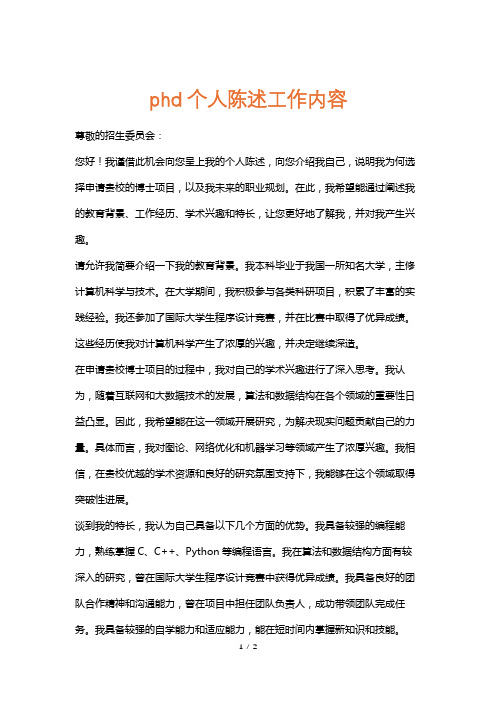
phd个人陈述工作内容尊敬的招生委员会:您好!我谨借此机会向您呈上我的个人陈述,向您介绍我自己,说明我为何选择申请贵校的博士项目,以及我未来的职业规划。
在此,我希望能通过阐述我的教育背景、工作经历、学术兴趣和特长,让您更好地了解我,并对我产生兴趣。
请允许我简要介绍一下我的教育背景。
我本科毕业于我国一所知名大学,主修计算机科学与技术。
在大学期间,我积极参与各类科研项目,积累了丰富的实践经验。
我还参加了国际大学生程序设计竞赛,并在比赛中取得了优异成绩。
这些经历使我对计算机科学产生了浓厚的兴趣,并决定继续深造。
在申请贵校博士项目的过程中,我对自己的学术兴趣进行了深入思考。
我认为,随着互联网和大数据技术的发展,算法和数据结构在各个领域的重要性日益凸显。
因此,我希望能在这一领域开展研究,为解决现实问题贡献自己的力量。
具体而言,我对图论、网络优化和机器学习等领域产生了浓厚兴趣。
我相信,在贵校优越的学术资源和良好的研究氛围支持下,我能够在这个领域取得突破性进展。
谈到我的特长,我认为自己具备以下几个方面的优势。
我具备较强的编程能力,熟练掌握C、C++、Python等编程语言。
我在算法和数据结构方面有较深入的研究,曾在国际大学生程序设计竞赛中获得优异成绩。
我具备良好的团队合作精神和沟通能力,曾在项目中担任团队负责人,成功带领团队完成任务。
我具备较强的自学能力和适应能力,能在短时间内掌握新知识和技能。
在未来的博士生涯中,我计划研究方向为图论及其在网络优化和机器学习中的应用。
我希望通过研究图论,为网络优化提供新的算法和理论支持,同时将图论应用于机器学习,提高机器学习算法的性能和效率。
我相信,通过不懈的努力,我能够在这一领域取得显著成果。
感谢招生委员会花时间阅读我的个人陈述。
希望能有机会加入贵校,与您共同开启这段美好的学术旅程。
此致敬礼!。
个人陈述模板2篇

个人陈述模板个人陈述模板第一篇:尊敬的招生委员会,我是一名对探索知识和追求进步充满热情的学生,现在向贵校申请。
我相信,贵校提供的优质教育和独特的学术氛围,将为我未来的学习和个人发展提供很好的支持和机会。
在我很小的时候,我就对科学和技术产生了浓厚的兴趣。
我常常通过阅读各类科普书籍和参加科学竞赛来拓宽我的知识面。
这不仅加深了我对科学和技术的理解,还培养了我解决问题和团队合作的能力。
这些经历让我认识到,只有通过不断的学习和实践,我才能不断提高自己的能力,并为社会做出贡献。
在高中期间,我积极参加各类课外活动和社会实践,以丰富自己的生活经历和社会视野。
我曾担任班级干部和学生会成员,负责组织各类活动和协调同学们的意见。
这些经历让我学会了领导和沟通的能力,也锻炼了我的组织和管理技巧。
我对自然科学和人文学科均有浓厚的兴趣,同时也关注当今社会的热点问题和挑战。
我认为,只有将不同学科的知识进行跨界整合,才能更好地应对未来的发展和变化。
因此,我希望能够在贵校的综合学科中深造,以拓宽自己的学术视野,丰富自己的知识结构。
在选择贵校时,我特别被贵校的校园文化和学术氛围所吸引。
我了解到,贵校注重培养学生的创新思维和实践能力,鼓励学生在科研和社会实践中发挥自己的才能。
这与我追求知识和发展个人能力的目标完全一致。
我相信,在贵校的学习和生活中,我将能够全面发展自己的潜力,并为未来的学术研究和社会事业做出积极的贡献。
最后,我真诚地希望能够成为贵校的一员,与优秀的师生共同学习和成长。
我深信,通过在贵校的学习和培养,我将能够实现自己的人生目标,并为社会的进步和发展贡献自己的力量。
再次感谢您对我的关注和考虑!敬上!第二篇:尊敬的招生委员会,我是一名对艺术及其表现形式充满热情的学生,现就我对贵校艺术专业的浓厚兴趣向贵校表达申请。
我相信,贵校的优质师资力量和丰富的艺术资源将为我的学术和个人发展提供很好的支持和机会。
从小,我就深受艺术的熏陶。
在幼儿园时,我就开始学习舞蹈,并取得了不俗的成绩。
个人陈述范文模板及如何写个人陈述
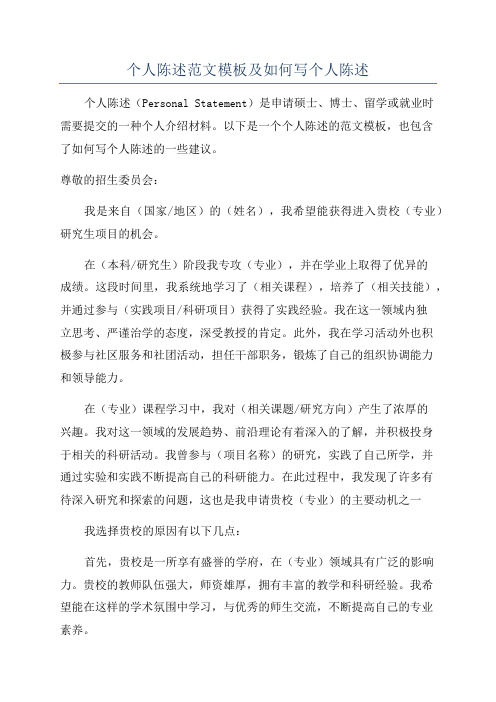
个人陈述范文模板及如何写个人陈述个人陈述(Personal Statement)是申请硕士、博士、留学或就业时需要提交的一种个人介绍材料。
以下是一个个人陈述的范文模板,也包含了如何写个人陈述的一些建议。
尊敬的招生委员会:我是来自(国家/地区)的(姓名),我希望能获得进入贵校(专业)研究生项目的机会。
在(本科/研究生)阶段我专攻(专业),并在学业上取得了优异的成绩。
这段时间里,我系统地学习了(相关课程),培养了(相关技能),并通过参与(实践项目/科研项目)获得了实践经验。
我在这一领域内独立思考、严谨治学的态度,深受教授的肯定。
此外,我在学习活动外也积极参与社区服务和社团活动,担任干部职务,锻炼了自己的组织协调能力和领导能力。
在(专业)课程学习中,我对(相关课题/研究方向)产生了浓厚的兴趣。
我对这一领域的发展趋势、前沿理论有着深入的了解,并积极投身于相关的科研活动。
我曾参与(项目名称)的研究,实践了自己所学,并通过实验和实践不断提高自己的科研能力。
在此过程中,我发现了许多有待深入研究和探索的问题,这也是我申请贵校(专业)的主要动机之一我选择贵校的原因有以下几点:首先,贵校是一所享有盛誉的学府,在(专业)领域具有广泛的影响力。
贵校的教师队伍强大,师资雄厚,拥有丰富的教学和科研经验。
我希望能在这样的学术氛围中学习,与优秀的师生交流,不断提高自己的专业素养。
其次,贵校提供了丰富多样的学术资源和实践机会。
我希望能够充分利用贵校的实验设备、研究机构等各类资源,开展深入的研究,为行业的发展做出贡献。
最后,贵校的(项目/课程)特色与我个人的研究兴趣高度契合。
贵校的教育理念和研究方向与我在申请信中提到的(相关课题/研究方向)紧密相联。
我相信,在这样的学习环境中,我能够不断提高自己的研究能力和创新思维。
综上所述,我相信我的学术能力、实践经验和团队合作能力使我适合进入贵校的(专业)研究生项目。
我希望有机会加入贵校,与优秀的教师和同学共同学习交流,实现个人的成长和价值提升。
美国留学申请个人陈述英文写作范文
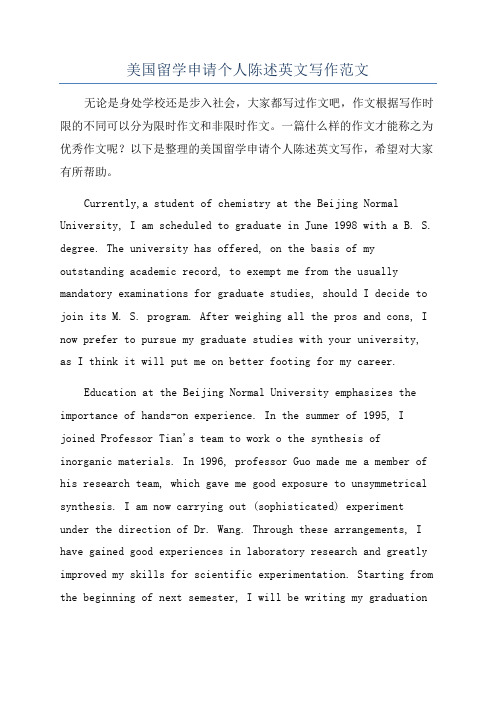
美国留学申请个人陈述英文写作范文无论是身处学校还是步入社会,大家都写过作文吧,作文根据写作时限的不同可以分为限时作文和非限时作文。
一篇什么样的作文才能称之为优秀作文呢?以下是整理的美国留学申请个人陈述英文写作,希望对大家有所帮助。
Currently,a student of chemistry at the Beijing Normal University, I am scheduled to graduate in June 1998 with a B. S. degree. The university has offered, on the basis of my outstanding academic record, to exempt me from the usually mandatory examinations for graduate studies, should I decide to join its M. S. program. After weighing all the pros and cons, I now prefer to pursue my graduate studies with your university, as I think it will put me on better footing for my career.Education at the Beijing Normal University emphasizes the importance of hands-on experience. In the summer of 1995, I joined Professor Tian's team to work o the synthesis of inorganic materials. In 1996, professor Guo made me a member of his research team, which gave me good exposure to unsymmetrical synthesis. I am now carrying out (sophisticated) experiment under the direction of Dr. Wang. Through these arrangements, I have gained good experiences in laboratory research and greatly improved my skills for scientific experimentation. Starting from the beginning of next semester, I will be writing my graduationpaper under the seasoned guidance of professor (zhong kexue), a research fellow from the Chinese Academy of Sciences.As the Beijing Normal University specializes in training teachers, I have also taken quite a number of general education courses, such as phycology, pedagogy and teaching methods. And earlier this year, I was awarded the Excellent Teaching Assistantship for my outstanding performance during theinternship at a high school.I would greatly appreciate it if you could give favorable consideration to my application for acceptance and financial aid.Upon graduation in 1990,I first took up the job of an assistant engineer in a biochemistry pharmaceutical manufacturer, where I was in charge of the development and analysis of several lines of products. I was given the responsibility for VD Calcium Tablet in the first two weeks, as I demonstrated that I was able to do independent research, particularly in terms ofquantitative analysis and microbiology inspection, from five raw materials to semi-made and finished products. As my talents showed up, I took charge of the production and inspection ofmore and more products. Towards the end of 1991, I was awardedthe honor of Excellent Employee in the factory of almost two thousand people in recognition of my contribution to its business.In these six years of working experience, I greatly improved myself in terms of technological expertise. I made chemical and microbiological examinations of different drugs skillfully and independently, successfully developed several new types of cosmetics, some of which merited the designation of Provincial Scientific Achievements. But more importantly, I learned to ask more sophisticated questions and then answer them.The years of being an engineer has taught me how to be a person. I learned to be both a team leader and a team player. Working in conjunction with others, I have always held onto the principle of being honest, modest and helpful to others, whether I was just a technician, an engineer or even the assistant tothe general manager. I enjoy working with other people. I have been well liked by my colleagues. At the farewell parties for me, some of my friends were so reluctant to say goodbye to me that they would burst into tears.While working for the Chinese factory, I was once "borrowed" by a college to teach there as an adjunct instructor for half a year. During those months, I often worked late to checkstudents' work and prepare for the next day's classes. I believe that this teaching experience will serve me well should you be able to offer me the position of a teaching assistant.Nevertheless, I am acutely aware that, in the researchfields I am interested in, there are still so many difficultsubjects and challenges awaiting for solution. In physical chemistry, China is relatively backward in the fields ofcatalyst development, catalyst inactivation, reaction dynamics, reaction mechanism, geochemical reaction mechanism,environmental-chemical reaction mechanism. In analytical chemistry, China lags relatively behind its Western counterparts in areas such as instrumental analysis and theoreticalanalytical chemistry. Basically, China relies on import forlarge-scale analytical instruments. By contrast, the United States has many world-leading academic specialists and encourages interdisciplinary programs. It will accord me a stimulating and liberal academic environment, apart from the sophisticated research facilities. Rice University is my top priority in applying for a Ph.D. program and I choose to specialize in physical chemistry or in analytical chemistry.At Rice University, I plan to learn broader-basedfoundational theories in my chosen fields. With my solid interdisciplinary knowledge and my ability for the quick assimilation of new knowledge, I intend to secure for myself aRA status to directly start my laboratory research under the guidance of my future advisor. I can also work as TA so that I can study while teaching and conducting my internship. I can apply, test and consolidate the theoretical knowledge that I acquire in the process of internship and degree program. Finally, through theoretical study and scientific research, I wouldendeavor to produce a well-written dissertation in which I hope to achieve some breakthroughs on both the theoretical and the research level.。
英语演讲稿:哈佛大学毕业演讲
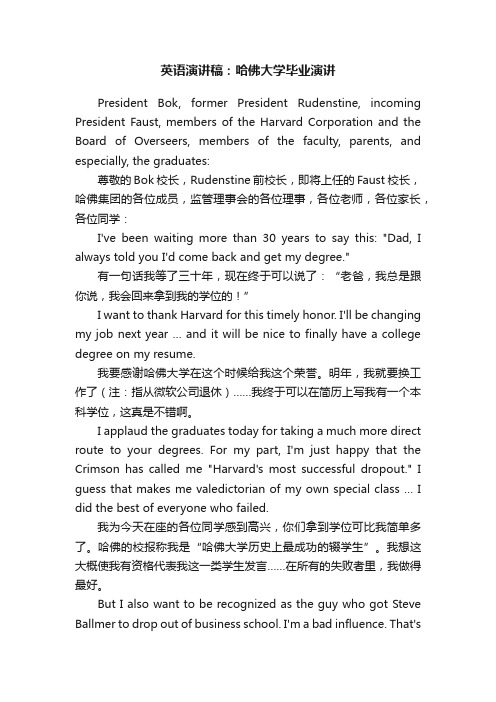
英语演讲稿:哈佛大学毕业演讲President Bok, former President Rudenstine, incoming President Faust, members of the Harvard Corporation and the Board of Overseers, members of the faculty, parents, and especially, the graduates:尊敬的Bok校长,Rudenstine前校长,即将上任的Faust校长,哈佛集团的各位成员,监管理事会的各位理事,各位老师,各位家长,各位同学:I've been waiting more than 30 years to say this: "Dad, I always told you I'd come back and get my degree."有一句话我等了三十年,现在终于可以说了:“老爸,我总是跟你说,我会回来拿到我的学位的!”I want to thank Harvard for this timely honor. I'll be changing my job next year … and it will be nice to finally have a college degree on my resume.我要感谢哈佛大学在这个时候给我这个荣誉。
明年,我就要换工作了(注:指从微软公司退休)……我终于可以在简历上写我有一个本科学位,这真是不错啊。
I applaud the graduates today for taking a much more direct route to your degrees. For my part, I'm just happy that the Crimson has called me "Harvard's most successful dropout." I guess that makes me valedictorian of my own special class (I)did the best of everyone who failed.我为今天在座的各位同学感到高兴,你们拿到学位可比我简单多了。
何江在哈佛大学2016毕业典礼上的演讲(中英版+个人简介)
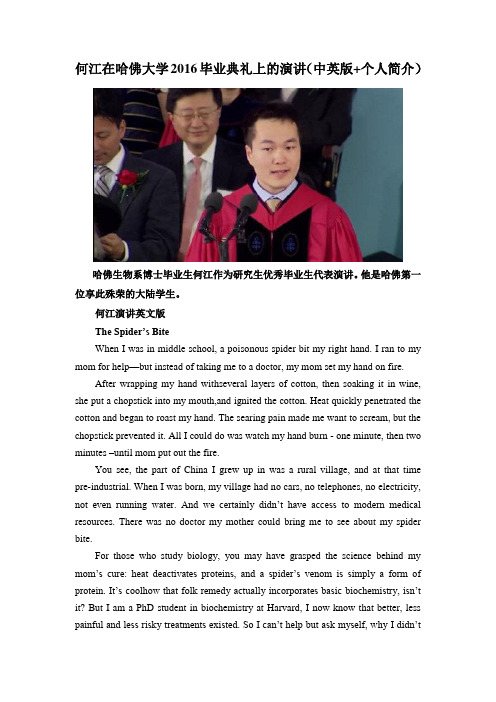
何江在哈佛大学2016毕业典礼上的演讲(中英版+个人简介)哈佛生物系博士毕业生何江作为研究生优秀毕业生代表演讲。
他是哈佛第一位享此殊荣的大陆学生。
何江演讲英文版The Spider’s BiteWhen I was in middle school, a poisonous spider bit my right hand. I ran to my mom for help—but instead of taking me to a doctor, my mom set my hand on fire.After wrapping my hand withseveral layers of cotton, then soaking it in wine, she put a chopstick into my mouth,and ignited the cotton. Heat quickly penetrated the cotton and began to roast my hand. The searing pain made me want to scream, but the chopstick prevented it. All I could do was watch my hand burn - one minute, then two minutes –until mom put out the fire.You see, the part of China I grew up in was a rural village, and at that time pre-industrial. When I was born, my village had no cars, no telephones, no electricity, not even running water. And we certainly didn’t have access to modern medical resources. There was no doctor my mother could bring me to see about my spider bite.For those who study biology, you may have grasped the science behind my mom’s cure: heat deactivates proteins, and a spider’s venom is simply a form of protein. It’s coolhow that folk remedy actually incorporates basic biochemistry, isn’t it? But I am a PhD student in biochemistry at Harvard, I now know that better, less painful and less risky treatments existed. So I can’t help but ask myself, why I didn’treceive oneat the time?Fifteen years have passed since that incident. I am happy to report that my hand is fine. But this question lingers, and I continue to be troubled by the unequal distribution of scientific knowledge throughout the world. We have learned to edit the human genome and unlock many secrets of how cancer progresses. We can manipulate neuronal activity literally with the switch of a light. Each year brings more advances in biomedical research-exciting, transformative accomplishments. Yet, despite the knowledge we have amassed, we haven’t been so successful in deploying it to where it’s needed most. According to the World Bank, twelve percent of the world’s population lives on less than $2 a day. Malnutrition kills more than 3 million children annually. Three hundred million peopleare afflicted by malaria globally. All over the world, we constantly see these problems of poverty, illness, and lack of resources impeding the flow of scientific information. Lifesaving knowledge we take for granted in the modern world is often unavailable in these underdeveloped regions.And in far too many places, people are still essentially trying to cure a spider bite with fire.While studying at Harvard, I saw how scientific knowledge can help others in simple, yet profound ways. The bird flu pandemic in the 2000s looked to my village like a spell cast by demons. Our folk medicine didn’t even have half-measures to offer. What’s more, farmers didn’t know the difference between common cold and flu; they didn’t understand that the flu was much more lethal than the common cold. Most people were also unaware that the virus could transmit across different species.So when I realized that simple hygiene practices like separating different animal species could contain the spread of the disease, and that I could help make this knowledge available to my village, that was my first “Aha” moment as a budding scientist. But it was more than that: it was also a vital inflection point in my own ethical development, my own self-understanding as a member of the global community.Harvard dares us to dream big, to aspire to change the world. Here on this Commencement Day, we are probably thinking of grand destinations and big adventures that await us. As for me, I am also thinking of the farmers in my village. My experiencehere reminds me how important it is for researchersto communicateour knowledge to those who need it. Because by using the sciencewe already have, wecould probably bring my village and thousands like it into the world you and I take for granted every day. And that’s an impact every one of us can make!But the question is, will we make the effort or not?More than ever before,our society emphasizes science and innovation. But an equally important emphasis should be on distributing the knowledge we have to where it’s needed. Changing the world doesn’t mean thateveryone has to find the next big thing. It can be as simple as becoming better communicators, and finding more creative ways to pass on the knowledge we have to people like my mom and the farmers in their local community. Our society also needs to recognize that the equal distribution of knowledge is a pivotal step of human development, and work to bring this into reality.And if we do that, then perhaps a teenager in rural China who is bitten by a spider will not have to burn his hand, but will know to seek a doctor instead.在我读初中的时候,有一次,一只毒蜘蛛咬伤了我的右手。
哈佛面试试题及答案
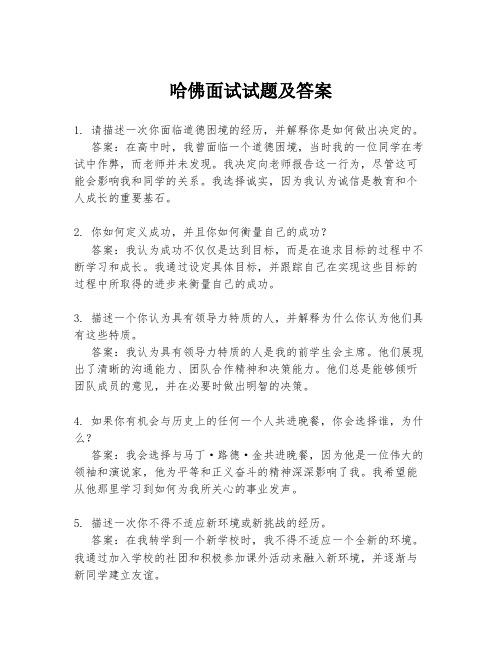
哈佛面试试题及答案1. 请描述一次你面临道德困境的经历,并解释你是如何做出决定的。
答案:在高中时,我曾面临一个道德困境,当时我的一位同学在考试中作弊,而老师并未发现。
我决定向老师报告这一行为,尽管这可能会影响我和同学的关系。
我选择诚实,因为我认为诚信是教育和个人成长的重要基石。
2. 你如何定义成功,并且你如何衡量自己的成功?答案:我认为成功不仅仅是达到目标,而是在追求目标的过程中不断学习和成长。
我通过设定具体目标,并跟踪自己在实现这些目标的过程中所取得的进步来衡量自己的成功。
3. 描述一个你认为具有领导力特质的人,并解释为什么你认为他们具有这些特质。
答案:我认为具有领导力特质的人是我的前学生会主席。
他们展现出了清晰的沟通能力、团队合作精神和决策能力。
他们总是能够倾听团队成员的意见,并在必要时做出明智的决策。
4. 如果你有机会与历史上的任何一个人共进晚餐,你会选择谁,为什么?答案:我会选择与马丁·路德·金共进晚餐,因为他是一位伟大的领袖和演说家,他为平等和正义奋斗的精神深深影响了我。
我希望能从他那里学习到如何为我所关心的事业发声。
5. 描述一次你不得不适应新环境或新挑战的经历。
答案:在我转学到一个新学校时,我不得不适应一个全新的环境。
我通过加入学校的社团和积极参加课外活动来融入新环境,并逐渐与新同学建立友谊。
6. 你认为自己最大的优势是什么?答案:我认为我最大的优势是我的适应能力。
无论面对什么样的新情况或挑战,我都能迅速调整自己的策略和方法,以适应环境。
7. 你如何看待团队合作的重要性?答案:我认为团队合作是实现目标的关键。
通过团队合作,我们可以集思广益,利用每个人的独特技能和知识,共同解决问题。
8. 描述一次你失败的经历,并解释你从中学到了什么。
答案:在我参加一个重要比赛时,我没有达到预期的成绩。
这次失败让我意识到了准备的重要性,以及在面对压力时保持冷静的重要性。
我学会了更加努力地准备,并学会了在压力下保持冷静。
手把手教你怎么写经典个人陈述(PS)

手把手教你怎么写经典个人陈述(PS)众所周知,美国是全世界教育最发达的国家,世界TOP100的学校,大多云集在美国。
随便说几个学校如:Johns Hopkins University约翰霍普金斯大学,University of Virginia弗吉尼亚大学,University of Rochester罗切斯特大学,Tulane University杜兰大学哪一个不是美国前30,前50的学校。
对于想申请这些世界顶级名校的学生,我们用一个词来形容就是PK。
但是,要进入这些,除了语言成绩:托福、雅思,研究生考试:GRE、GMAT等的必要条件那么,接下来最重要的东西就是个人陈述Personal Statement(简称PS)。
PS的重要性,好比你去一家公司面试,带上了基本的学历证明,同时也需要你的个人简历和情况介绍。
申请美国留学PS就是起到了如此重要的作用。
在高手如林的申请者中,你的材料如何能被名校入学办公室接受,并让他们给你一个你梦寐以求名校的offer。
除了基本上述的基本条件外,PS就是最好的王牌ACE。
那么接下来,美国留学(https://meiguo.)为同学们从7个主体来告诉你,如何拿你的PS,来吸引名校面试官的青睐。
主体一:Your Family家庭及家庭对自己的影响描述你的家庭并解释他们为什么对你来说很重要。
可叙述父母对自己的启发(兴趣、专长等),父母的教育程度及工作以及这些在你生命中有什么影响。
另外,若有兄弟姐妹,也可以叙述他们对你有和特别影响。
(尽量用小故事的形式来说明)我生活在一个普通的三口之家,正是因为我有这样一个普通的家庭,所以使得我能够健康的成长,并且可以接受到良好的教育。
我的父母在他们那个年代都属于受过高等教育的人,所以他们对我的要求要比一般家庭的父母对待他们的孩子的要求要高,因此我从小就受到来自各个方面的知识的熏陶。
我爸爸是一名外科医生。
他的工作要求他凡事都必须认真仔细的对待,由于这个原因,爸爸从小就要求我要认真的做好每一件事,久而久之也培养了我做事认真的生活方式。
女主考哈佛需要推荐信(3篇)
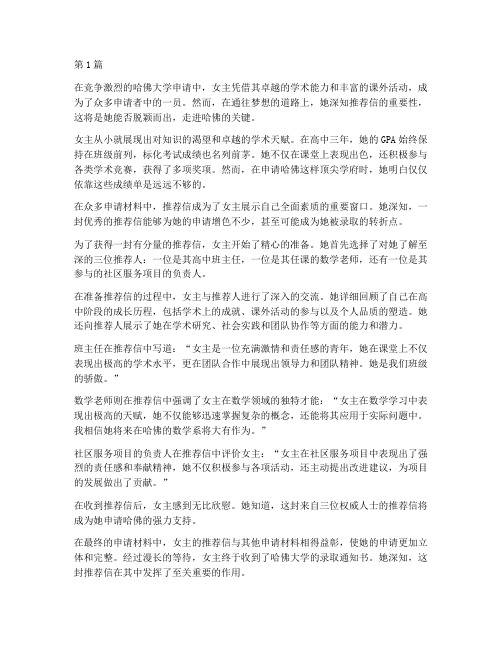
第1篇在竞争激烈的哈佛大学申请中,女主凭借其卓越的学术能力和丰富的课外活动,成为了众多申请者中的一员。
然而,在通往梦想的道路上,她深知推荐信的重要性,这将是她能否脱颖而出,走进哈佛的关键。
女主从小就展现出对知识的渴望和卓越的学术天赋。
在高中三年,她的GPA始终保持在班级前列,标化考试成绩也名列前茅。
她不仅在课堂上表现出色,还积极参与各类学术竞赛,获得了多项奖项。
然而,在申请哈佛这样顶尖学府时,她明白仅仅依靠这些成绩单是远远不够的。
在众多申请材料中,推荐信成为了女主展示自己全面素质的重要窗口。
她深知,一封优秀的推荐信能够为她的申请增色不少,甚至可能成为她被录取的转折点。
为了获得一封有分量的推荐信,女主开始了精心的准备。
她首先选择了对她了解至深的三位推荐人:一位是其高中班主任,一位是其任课的数学老师,还有一位是其参与的社区服务项目的负责人。
在准备推荐信的过程中,女主与推荐人进行了深入的交流。
她详细回顾了自己在高中阶段的成长历程,包括学术上的成就、课外活动的参与以及个人品质的塑造。
她还向推荐人展示了她在学术研究、社会实践和团队协作等方面的能力和潜力。
班主任在推荐信中写道:“女主是一位充满激情和责任感的青年,她在课堂上不仅表现出极高的学术水平,更在团队合作中展现出领导力和团队精神。
她是我们班级的骄傲。
”数学老师则在推荐信中强调了女主在数学领域的独特才能:“女主在数学学习中表现出极高的天赋,她不仅能够迅速掌握复杂的概念,还能将其应用于实际问题中。
我相信她将来在哈佛的数学系将大有作为。
”社区服务项目的负责人在推荐信中评价女主:“女主在社区服务项目中表现出了强烈的责任感和奉献精神,她不仅积极参与各项活动,还主动提出改进建议,为项目的发展做出了贡献。
”在收到推荐信后,女主感到无比欣慰。
她知道,这封来自三位权威人士的推荐信将成为她申请哈佛的强力支持。
在最终的申请材料中,女主的推荐信与其他申请材料相得益彰,使她的申请更加立体和完整。
我在哈佛上大学
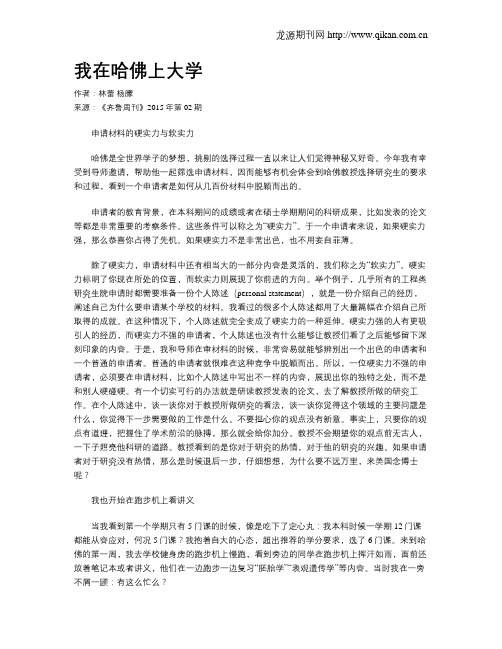
我在哈佛上大学作者:林蕾杨朦来源:《齐鲁周刊》2015年第02期申请材料的硬实力与软实力哈佛是全世界学子的梦想,挑剔的选择过程一直以来让人们觉得神秘又好奇。
今年我有幸受到导师邀请,帮助他一起筛选申请材料,因而能够有机会体会到哈佛教授选择研究生的要求和过程,看到一个申请者是如何从几百份材料中脱颖而出的。
申请者的教育背景,在本科期间的成绩或者在硕士学期期间的科研成果,比如发表的论文等都是非常重要的考察条件。
这些条件可以称之为“硬实力”。
于一个申请者来说,如果硬实力强,那么恭喜你占得了先机。
如果硬实力不是非常出色,也不用妄自菲薄。
除了硬实力,申请材料中还有相当大的一部分内容是灵活的,我们称之为“软实力”。
硬实力标明了你现在所处的位置,而软实力则展现了你前进的方向。
举个例子,几乎所有的工程类研究生院申请时都需要准备一份个人陈述(personal statement),就是一份介绍自己的经历,阐述自己为什么要申请某个学校的材料。
我看过的很多个人陈述都用了大量篇幅在介绍自己所取得的成就。
在这种情况下,个人陈述就完全变成了硬实力的一种延伸。
硬实力强的人有更吸引人的经历,而硬实力不强的申请者,个人陈述也没有什么能够让教授们看了之后能够留下深刻印象的内容。
于是,我和导师在审材料的时候,非常容易就能够辨别出一个出色的申请者和一个普通的申请者。
普通的申请者就很难在这种竞争中脱颖而出。
所以,一位硬实力不强的申请者,必须要在申请材料,比如个人陈述中写出不一样的内容,展现出你的独特之处,而不是和别人硬碰硬。
有一个切实可行的办法就是研读教授发表的论文,去了解教授所做的研究工作。
在个人陈述中,谈一谈你对于教授所做研究的看法,谈一谈你觉得这个领域的主要问题是什么,你觉得下一步需要做的工作是什么。
不要担心你的观点没有新意。
事实上,只要你的观点有道理,把握住了学术前沿的脉搏,那么就会给你加分。
教授不会期望你的观点前无古人,一下子照亮他科研的道路。
美国哈佛大学ps写作要求
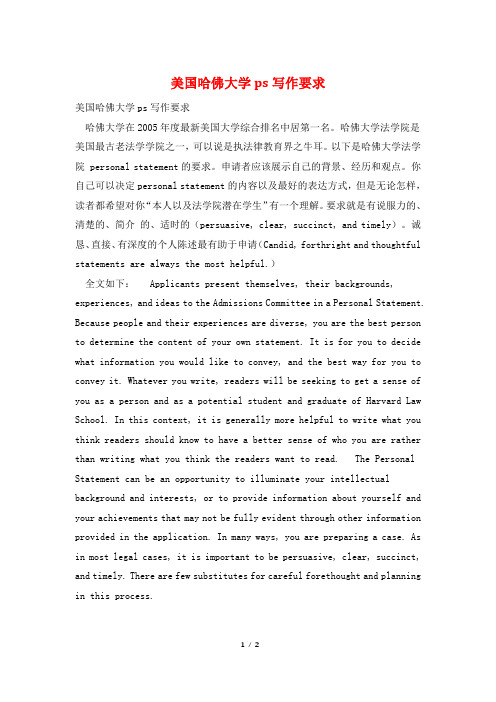
美国哈佛大学ps写作要求美国哈佛大学ps写作要求哈佛大学在2005年度最新美国大学综合排名中居第一名。
哈佛大学法学院是美国最古老法学学院之一,可以说是执法律教育界之牛耳。
以下是哈佛大学法学院 personal statement的要求。
申请者应该展示自己的背景、经历和观点。
你自己可以决定personal statement的内容以及最好的表达方式,但是无论怎样,读者都希望对你“本人以及法学院潜在学生”有一个理解。
要求就是有说服力的、清楚的、简介的、适时的(persuasive, clear, succinct, and timely)。
诚恳、直接、有深度的个人陈述最有助于申请(Candid, forthright and thoughtful statements are always the most helpful.)全文如下: Applicants present themselves, their backgrounds, experiences, and ideas to the Admissions Committee in a Personal Statement. Because people and their experiences are diverse, you are the best person to determine the content of your own statement. It is for you to decide what information you would like to convey, and the best way for you to convey it. Whatever you write, readers will be seeking to get a sense of you as a person and as a potential student and graduate of Harvard Law School. In this context, it is generally more helpful to write what you think readers should know to have a better sense of who you are rather than writing what you think the readers want to read. The Personal Statement can be an opportunity to illuminate your intellectual background and interests, or to provide information about yourself and your achievements that may not be fully evident through other information provided in the application. In many ways, you are preparing a case. As in most legal cases, it is important to be persuasive, clear, succinct, and timely. There are few substitutes for careful forethought and planning in this process.We understand that it can be difficult to discuss oneself on paper, but our experience is that written statements are valuable in the selection process. Candid, forthright and thoughtful statements are always the most helpful.。
申请国外大学的个人陈述
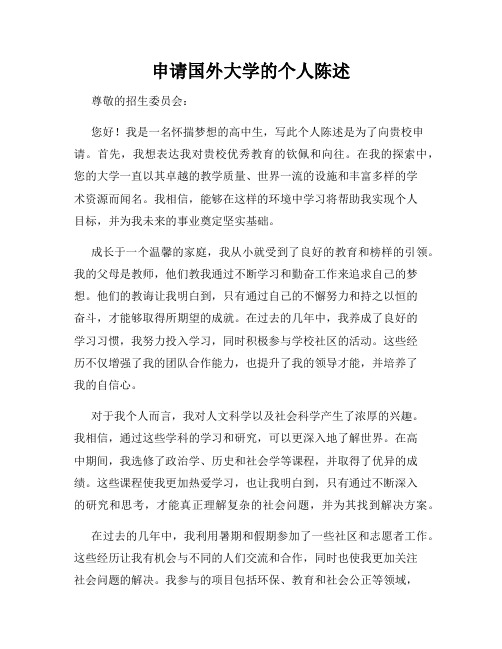
申请国外大学的个人陈述尊敬的招生委员会:您好!我是一名怀揣梦想的高中生,写此个人陈述是为了向贵校申请。
首先,我想表达我对贵校优秀教育的钦佩和向往。
在我的探索中,您的大学一直以其卓越的教学质量、世界一流的设施和丰富多样的学术资源而闻名。
我相信,能够在这样的环境中学习将帮助我实现个人目标,并为我未来的事业奠定坚实基础。
成长于一个温馨的家庭,我从小就受到了良好的教育和榜样的引领。
我的父母是教师,他们教我通过不断学习和勤奋工作来追求自己的梦想。
他们的教诲让我明白到,只有通过自己的不懈努力和持之以恒的奋斗,才能够取得所期望的成就。
在过去的几年中,我养成了良好的学习习惯,我努力投入学习,同时积极参与学校社区的活动。
这些经历不仅增强了我的团队合作能力,也提升了我的领导才能,并培养了我的自信心。
对于我个人而言,我对人文科学以及社会科学产生了浓厚的兴趣。
我相信,通过这些学科的学习和研究,可以更深入地了解世界。
在高中期间,我选修了政治学、历史和社会学等课程,并取得了优异的成绩。
这些课程使我更加热爱学习,也让我明白到,只有通过不断深入的研究和思考,才能真正理解复杂的社会问题,并为其找到解决方案。
在过去的几年中,我利用暑期和假期参加了一些社区和志愿者工作。
这些经历让我有机会与不同的人们交流和合作,同时也使我更加关注社会问题的解决。
我参与的项目包括环保、教育和社会公正等领域,这些经历使我更加理解了世界的不公平现象,并激发了我的责任感和社会意识。
我希望能够进一步拓宽我的知识和视野,探索更多的学术领域。
我相信,贵校的师资力量和丰富的学术资源将为我提供一个理想的学习环境。
我迫切期待着与优秀的教授和热情的同学们的学术交流,我相信这将激发我学习的热情,并帮助我实现自己的梦想。
最后,我想再次表达我对贵校的向往和对学习的热情。
如果有机会成为贵校的一员,我将全力以赴,在学业和社会参与方面取得卓越的成就。
我相信自己有能力与贵校的精英们并肩前行,共同创造更加美好的未来。
留学申请文书个人陈述范文

留学申请文书个人陈述范文国外留学可以在很大程度上提高我们的潜力,在国外毕竟事事都要靠自己,而且国外的开放程度很高。
下面就是小编给大家带来的留学申请文书个人陈述范文借鉴,希望能帮助到大家!留学申请文书个人陈述范文Dear _,An experienced engineer of security printing with China’s Central Bank, I now would like to scale higher intellectual heights by pursuing Ph. D. studies in mechanical engineering at your university. I believe that my strong background in CAD has adequately prepared me to embark on this endeavor.I have been working since 1996 for the People’s Bank of China, a Chinese version of the Federal Reserve, at its unique research institute of security printing, with the responsibility of designing the Chinese currency and the machinery to produce it. By engaging me in a variety of projects, the job afforded me ample exposure to cutting-edge developments in computer technologies, particularly in CAD software. I have, for example, recently redeveloped a purchased CAD (Computer Aided Design) software to make it more suitable for our own purposes. By adding our own part/subassembly to the database and make our own drawing criteria, we have achieved dramatically better efficiency.My job performance, which has won me professional respect from all of my colleagues, was achieved thanks to the strong background I acquired as a student in computer science. My undergraduate GPA ranked first among the 63 students of classmates in mechanical department, for which I was awarded first-class and second-class prizes many times. My graduate GPAranked among the top 4% of the 105 students in my year, which won me the “San Hao” scholarship every year during the three years of my graduate studies.Unlike many other Chinese students, who are content with performing well in exams, I made a point of learning through my own hands-on experiences. In the Master’s program at the Beijing Institute of Printing, I gained an in-depth understanding of artificial intelligence, including expert system and genetic algorithm, especially in neural network. For my thesis, I programmed a multi-level BP neural network with C language to analyze my mathematical model, and applied much of my knowledge in optimization. I thus became able to program with a host of different computer languages, especially C++, with which I helped my graduate advisor to design a paper-cutting machine. To analyze the mechanism statically and dynamically, I programmed a software system to analyze and emulate it on screen. In undergraduate studies, I had often programmed with Fortran77 and the Basic language.Upon the completion of my Master’s studies, I easily passed the doctoral record examination in CAD/CAM of Beijing University, one f the top universities in China. But I gave up the opportunity in order to gain more practical experience in the industry. The decision proved to be right, as it guaranteed me better access to sophisticated facilities, such as state-of-the-art personal computers. With the People’s Bank of China, I have thus accumulated solid expertise in many kinds of operating and application software systems, particularly in CAD. I now have a firm grip on the latest developments in computer science in China.The challenges I met and the successes I achieved at thePeople’s Bank have not only endowed me with confidence but also fired off my desire to further improve myself. I have enjoyed high-quality and efficient production with the use of a kind of PC-based CAD software, MDT, developed by Autodesk Corporation. I now have a dream: some day, every person can design his favorite product with some sort of CAD software, and then search for an ideal factory over high-speed internet its production; and the factory will put specifications of the product, as it has received them via the high-speed internet into its CIMS, and out pops the product, as designed, at the end of the factory’s production line. It is a beautiful dream for every engineer, but many difficulties the speed of data-transfer and how to manage the product data among CAD, CAM, CAPP and CAE systems. These questions are fascinating, and I would like to come up with my own answers to them.To prepare myself for advanced studies in your country, I have persisted in improving my English proficiency. As demonstrated by my score of 700 (96%) in the verbal section of GRE, I now have an adequate command of English for undertaking graduate studies in your program.After carefully comparing the strengths of many universities, I find Mercy University particularly suited for my purpose. It has got the best combination of quality faculty, many state-of-the-art facilities, and an intriguing academic environment. Currently, China still lags significantly behind Western countries in mechanical engineering. I hope that, with a few years of graduate studies under your seasoned guidance, I will be able to return to my motherland and help bring mechanical engineering in my country to international standards.Although my ultimate objective is a Ph. D. degree, I amwilling to do a Master’s d egree if necessary. In either case, I would like to concentrate my studies in one or a combination of the following areas: CAD, CAM, CIMS, Computer graphics, Mechanical design, Mechanical manufacturing, Optimization, Artificial intelligence, and Robotics. Your favorable evaluation of my application will be highly appreciated.Yours sincerely,/shenqing/丹麦留学三所顶尖院校介绍1. 哥本哈根大学哥本哈根大学是欧洲顶尖的大学之一,校园位于丹麦繁荣的首都中心。
美国留学个人陈述参考范文
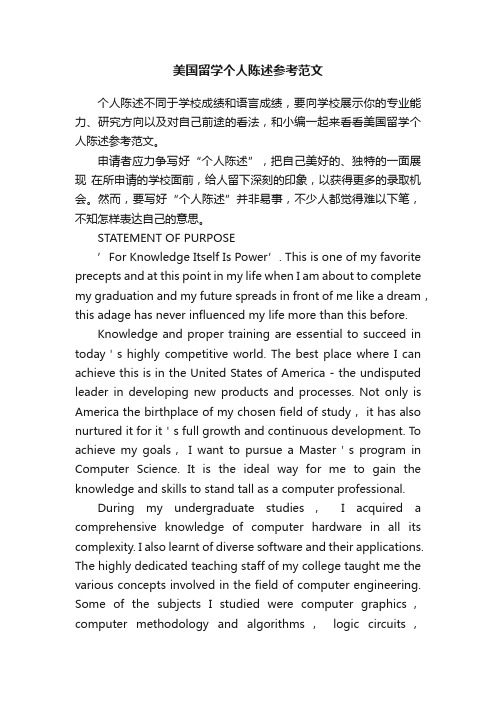
美国留学个人陈述参考范文个人陈述不同于学校成绩和语言成绩,要向学校展示你的专业能力、研究方向以及对自己前途的看法,和小编一起来看看美国留学个人陈述参考范文。
申请者应力争写好“个人陈述”,把自己美好的、独特的一面展现在所申请的学校面前,给人留下深刻的印象,以获得更多的录取机会。
然而,要写好“个人陈述”并非易事,不少人都觉得难以下笔,不知怎样表达自己的意思。
STATEMENT OF PURPOSE’For Knowledge Itself Is Power’. This is one of my favorite precepts and at this point in my life when I am about to complete my graduation and my future spreads in front of me like a dream,this adage has never influenced my life more than this before.Knowledge and proper training are essential to succeed in today's highly competitive world. The best place where I can achieve this is in the United States of America - the undisputed leader in developing new products and processes. Not only is America the birthplace of my chosen field of study, it has also nurtured it for it's full growth and continuous development. T o achieve my goals,I want to pursue a Master's program in Computer Science. It is the ideal way for me to gain the knowledge and skills to stand tall as a computer professional.During my undergraduate studies,I acquired a comprehensive knowledge of computer hardware in all its complexity. I also learnt of diverse software and their applications. The highly dedicated teaching staff of my college taught me the various concepts involved in the field of computer engineering. Some of the subjects I studied were computer graphics,computer methodology and algorithms,logic circuits,principles of communication engineering,C programming,object oriented programming as well as programming using different tools.I take a keen interest in Networking and Database Management Systems. As a part of my final year curriculum, I am working on a project with one of the India's finest web-site designing companies - MicroGiga Info. Sys. Ltd. The aim of the project is to create a web-site. The web-site, called "Jobs4All",aims to provide the user with a job depending upon his qualifications. Various database concepts',programming scripts and the maintenance of a server are some of the features included in our web-site. Some of the products and tools used are ASP scripts, Java scripts, Microsoft Access '97, Personal Web Server, etc. I am also interested in System Programming. For this very reason, I have selected Compiler Construction as the elective subject for my final year.There is truly no end to learning, as this has become a world where a constant addition to abilities is the key to growth in a dynamic world. I am fortunate to belong to a family that places a high value of education. I have been given all the encouragement and facility to develop my talents and interests.I have completed several courses in public speaking and leadership training. Sports, music and reading also fill my life. I was also one of the organizer's for the Open Software competition in TECHNOMANIA '98, which is an inter-college festival annually, organized annually by my college. I am also an active participant in various events held in other institutes.I seek to fulfill my goals in an environment that encourages creativity and motivation. I feel confident that the staff and facilities in your institute will provide me with such anenvironment. I am well aware of the demands of studying in the more competitive American environment. I am certain that I am mentally and physically competent to succeed at your school. I am basically a hard working and a sincere person. My enthusiasm and urge to excel will help me to make the best use of every learning opportunity.In conclusion I would like to say that the knowledge gained from 4 years of engineering has provided me with a solid foundation. This will certainly help me in my desire to specialize in my chosen field. My country India has a thriving software industry. I aim to study abroad and return with the skill and competence to find my mark and be a vital part of this booming,futuristic industry. I assure you of my sincerity, dedication and hard work.最后小编提醒大家,虽然文章已经很全面的解释了关于美国留学个人陈述参考范文的知识,但是每个人可能会碰到不一样的问题,大家还是需要根据自身的情况去合理的对待,避免陷入误区。
哈佛何江个人陈述
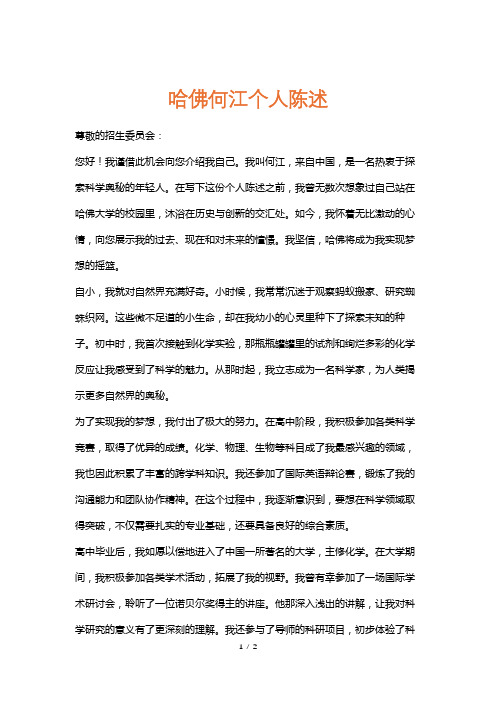
哈佛何江个人陈述尊敬的招生委员会:您好!我谨借此机会向您介绍我自己。
我叫何江,来自中国,是一名热衷于探索科学奥秘的年轻人。
在写下这份个人陈述之前,我曾无数次想象过自己站在哈佛大学的校园里,沐浴在历史与创新的交汇处。
如今,我怀着无比激动的心情,向您展示我的过去、现在和对未来的憧憬。
我坚信,哈佛将成为我实现梦想的摇篮。
自小,我就对自然界充满好奇。
小时候,我常常沉迷于观察蚂蚁搬家、研究蜘蛛织网。
这些微不足道的小生命,却在我幼小的心灵里种下了探索未知的种子。
初中时,我首次接触到化学实验,那瓶瓶罐罐里的试剂和绚烂多彩的化学反应让我感受到了科学的魅力。
从那时起,我立志成为一名科学家,为人类揭示更多自然界的奥秘。
为了实现我的梦想,我付出了极大的努力。
在高中阶段,我积极参加各类科学竞赛,取得了优异的成绩。
化学、物理、生物等科目成了我最感兴趣的领域,我也因此积累了丰富的跨学科知识。
我还参加了国际英语辩论赛,锻炼了我的沟通能力和团队协作精神。
在这个过程中,我逐渐意识到,要想在科学领域取得突破,不仅需要扎实的专业基础,还要具备良好的综合素质。
高中毕业后,我如愿以偿地进入了中国一所著名的大学,主修化学。
在大学期间,我积极参加各类学术活动,拓展了我的视野。
我曾有幸参加了一场国际学术研讨会,聆听了一位诺贝尔奖得主的讲座。
他那深入浅出的讲解,让我对科学研究的意义有了更深刻的理解。
我还参与了导师的科研项目,初步体验了科研工作的艰辛与快乐。
这些经历使我更加坚定了走向科研道路的决心。
在学术之余,我也热衷于参加社会实践活动。
曾有一次,我加入了一个志愿者团队,赴贫困山区支教。
在那里,我不仅教授孩子们知识,还与他们一起生活、一起游戏。
这段经历让我深刻体会到教育的重要性,也让我更加珍惜自己所拥有的资源。
我相信,知识的力量可以改变命运,而我也要为传递这份力量贡献自己的力量。
如今,我站在人生的十字路口,面临着一个重要的选择。
哈佛大学的声誉和资源吸引着我,我相信在那里,我将得到更好的发展。
大学个人陈述模板【十三篇】

以下是为大家整理的关于大学个人陈述模板的文章13篇, 欢迎大家参考查阅!【篇1】大学个人陈述模板我是一个自小受传统文化熏陶的男孩子,很喜欢看诸子百家的书。
犹记得小时候看的第一本诸子的书大概是《道德经》,而后是《论语》。
现在想来,这两本书对我的影响都是很大的,使我从小就有了平静而自然的心态和博大而宽容的胸襟。
再后来,我读的书越来越多,诸子就再不能满足我的需求了,于是开始读史:从《史记》到《晋书》,我仿佛获新生般,随着这些伟大的史官们的文字,伴着那些王侯将相们,走过了许许多多的岁月。
我喜欢拿诸子的言论,代入到那些王侯将相的人生中,从而相互印证;我还喜欢从自己经历的事情,联想到史书中的记录,得出个与古人暗和的结论,而后暗自得意。
读史书,越读越有乐趣,越品越有回味,尤其是读到自己崇拜的人,譬如谢安。
我崇拜谢安,主要是因为欣赏他的那种平常心、通脱心还有他的处世之道,而这些,都是我努力的方向。
其实不光是书,围棋对我的影响也很深远。
我是自七岁半学棋的,较之同龄人颇晚,那是因为父母从不限制我的发展:之前我没有什么兴趣爱好,父母提议我学小号,于是去学。
后来偶然全心喜欢上围棋,父母便许我弃了小号,让我去学棋。
大概学了有半年多罢,我便与比我早几年学棋的同龄人旗鼓相当了。
诚然,我小时候也曾有过有朝一日成为世界冠军这样的梦想,但随着年龄的增长,我越发觉得学围棋更主要的其实是为了陶冶情操,而非其它。
围棋让我能面就大、慎勿轻速这样的道理,不也是人生的哲学吗?旧时称赞一个人才华横溢,往往言此人琴棋书画、诗词歌赋样样精通。
我于琴一道只是门外汉,于书画也只会鉴赏把玩而已,倒是对于诗词歌赋常常颇有见解。
我常写旧体诗,很喜欢听那些平平仄仄的婉转悠扬。
甚至为了读通入声字,还曾有过学习广东话的想法,可惜无人教我。
我写诗,写词,也写文,喜欢从古文字中寻找那种蕴藉着悠远意境的感觉,喜欢赠给需要鼓励、安慰的朋友一篇小序,喜欢和朋友唱和,也喜欢自我陶醉。
哈弗申请书

您好!我叫[您的姓名],来自[您的家乡或现居住地],目前就读于[您的学校名称]的[您的年级]年级,是一名热爱学习、积极进取的学生。
在此,我怀着无比激动的心情,向您提交我的哈弗申请书,希望能有机会成为哈弗大学的一员,继续深造。
一、个人简介我出生于一个热爱教育、重视家庭教育的家庭。
从小,我就受到了良好的家庭教育,父母教导我要勤奋学习,树立远大理想。
在他们的熏陶下,我逐渐形成了独立思考、勇于创新、积极进取的品质。
二、学术成绩在学习上,我始终保持严谨的态度,勤奋刻苦,成绩优异。
在高中的三年里,我的成绩始终名列前茅,多次获得校级、市级奖项。
此外,我还积极参加各类学科竞赛,取得了优异的成绩。
例如,在[具体竞赛名称]中,我荣获了[奖项名称]。
三、兴趣爱好除了学术,我还热衷于各类兴趣爱好。
在课余时间,我积极参加学校组织的各类活动,如辩论赛、演讲比赛等。
这些活动不仅锻炼了我的口才和表达能力,还让我结识了许多志同道合的朋友。
此外,我还热爱体育运动,擅长篮球、足球等,积极参加学校体育活动,为班级争光。
四、为什么选择哈弗大学哈弗大学作为世界顶尖的学府,拥有丰富的教育资源、卓越的师资力量和广阔的发展平台。
在这里,我可以接触到世界各地的优秀人才,拓宽视野,提升自己的综合素质。
以下是我选择哈弗大学的几个原因:1. 哈弗大学在各个领域都享有盛誉,尤其是[您的专业领域],为我提供了深入学习的机会。
2. 哈弗大学注重培养学生的创新精神和实践能力,这与我的个人发展理念相契合。
3. 哈弗大学拥有丰富的校园文化,可以让我在学术之余,丰富自己的人生经历。
五、未来规划进入哈弗大学后,我将继续努力学习,提升自己的专业素养。
在学术研究方面,我希望能够在[具体研究领域]取得一定的成果。
同时,我还将积极参与社会实践,将所学知识应用于实际,为社会做出贡献。
总之,我坚信自己具备进入哈弗大学深造的潜力和能力。
在此,我恳请招生委员会给予我这次宝贵的机会,让我在哈弗大学的沃土上茁壮成长,为实现自己的人生目标而努力奋斗。
(完整版)哈佛大学英语介绍
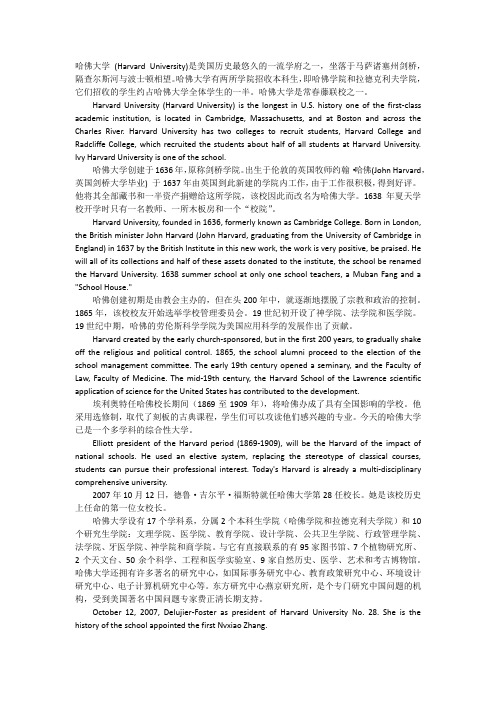
哈佛大学(Harvard University)是美国历史最悠久的一流学府之一,坐落于马萨诸塞州剑桥,隔查尔斯河与波士顿相望。
哈佛大学有两所学院招收本科生,即哈佛学院和拉德克利夫学院,它们招收的学生约占哈佛大学全体学生的一半。
哈佛大学是常春藤联校之一。
Harvard University (Harvard University) is the longest in U.S. history one of the first-class academic institution, is located in Cambridge, Massachusetts, and at Boston and across the Charles River. Harvard University has two colleges to recruit students, Harvard College and Radcliffe College, which recruited the students about half of all students at Harvard University. Ivy Harvard University is one of the school.哈佛大学创建于1636年,原称剑桥学院。
出生于伦敦的英国牧师约翰·哈佛(John Harvard,英国剑桥大学毕业) 于1637年由英国到此新建的学院内工作,由于工作很积极,得到好评。
他将其全部藏书和一半资产捐赠给这所学院,该校因此而改名为哈佛大学。
1638年夏天学校开学时只有一名教师、一所木板房和一个“校院”。
Harvard University, founded in 1636, formerly known as Cambridge College. Born in London, the British minister John Harvard (John Harvard, graduating from the University of Cambridge in England) in 1637 by the British Institute in this new work, the work is very positive, be praised. He will all of its collections and half of these assets donated to the institute, the school be renamed the Harvard University. 1638 summer school at only one school teachers, a Muban Fang and a "School House."哈佛创建初期是由教会主办的,但在头200年中,就逐渐地摆脱了宗教和政治的控制。
如何写留学申请的个人陈述

美国留学申请如何写个人陈述什么是个人陈述个人陈述是在申请过程中按照学校要求来写一篇有关申请人背景,学术成就和未来研究和职业目标的文章。
一篇成功的个人陈述不但应该语言流畅,逻辑严谨,层次分明,更要充分显示申请人的才华并抓住审阅人的注意力。
几乎所有学校都要求提交个人陈述。
个人陈述也有不同的名称,如Personal Statement,Statement of Purpose,Statement of Intent, Statement of Objectives, Academic Statement,Study Plan,Academic Objectives等。
个人陈述应当包含以下内容:(一)申请者的学术或专业兴趣及背景;(二)欲研究的方向;(三)未来的职业目标.如果个人陈述写作得当,可以很大程度地提高申请者获得录取和奖学金的机会.这对申请者来说是一个绝好的机会。
可惜的是很多申请者对TOEFL、GRE可谓呕心沥血,而对个人陈述往往一蹴而就,敷衍了事,内容贫乏、语法错误连篇。
而西方的大学并不单是通过传统的考试来考评其申请者的资格,这并不是说他们的录取标准不严格。
外国教授在决定你是否正是他们想要的人时,首先希望听一听你对于你自己作何评价。
当你通过申请文书来介绍你自己时,你会发现所面临的机遇和挑战同样之大.要写出成功的申请文书仅仅有那些适用于任何类型写作的基本写作技巧(清晰、简洁)是远远不够的.一篇好的申请文书要求申请人能够用一种与其他申请人完全不同方式,巧妙地展现自己的独特个性和经验。
这是一件要求比较高,通常非常繁累的工作。
这不仅仅对中国人如此,以英语为母语的人在此类写作时也会感到十分的头疼,但是我们中国人还需克服语言的障碍.美国留学申请如何写个人陈述个人陈述的内容应包含下列三项资料:(一)申请者的学术或专业兴趣及背景;(二)欲研究的方向;(三)未来的职业目标;写作时,依以上三点将文章分为三个主要部分.不要像列清单,也不要重覆申请表格已有的资料。
2023年哈佛大学申请材料及注意事项
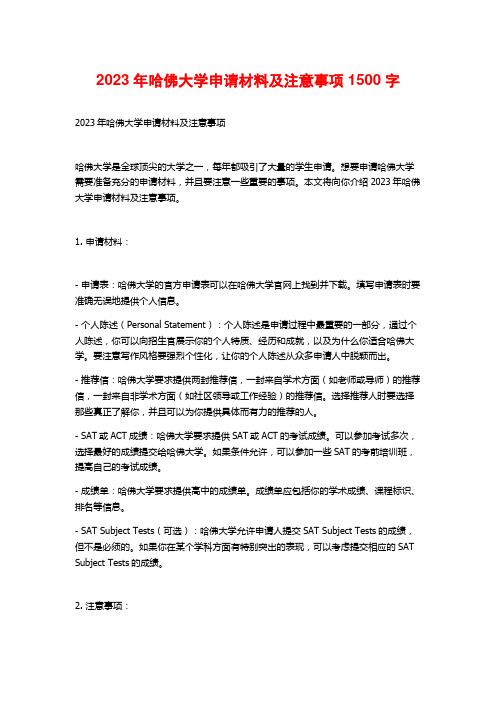
2023年哈佛大学申请材料及注意事项1500字2023年哈佛大学申请材料及注意事项哈佛大学是全球顶尖的大学之一,每年都吸引了大量的学生申请。
想要申请哈佛大学需要准备充分的申请材料,并且要注意一些重要的事项。
本文将向你介绍2023年哈佛大学申请材料及注意事项。
1. 申请材料:- 申请表:哈佛大学的官方申请表可以在哈佛大学官网上找到并下载。
填写申请表时要准确无误地提供个人信息。
- 个人陈述(Personal Statement):个人陈述是申请过程中最重要的一部分,通过个人陈述,你可以向招生官展示你的个人特质、经历和成就,以及为什么你适合哈佛大学。
要注意写作风格要强烈个性化,让你的个人陈述从众多申请人中脱颖而出。
- 推荐信:哈佛大学要求提供两封推荐信,一封来自学术方面(如老师或导师)的推荐信,一封来自非学术方面(如社区领导或工作经验)的推荐信。
选择推荐人时要选择那些真正了解你,并且可以为你提供具体而有力的推荐的人。
- SAT或ACT成绩:哈佛大学要求提供SAT或ACT的考试成绩。
可以参加考试多次,选择最好的成绩提交给哈佛大学。
如果条件允许,可以参加一些SAT的考前培训班,提高自己的考试成绩。
- 成绩单:哈佛大学要求提供高中的成绩单。
成绩单应包括你的学术成绩、课程标识、排名等信息。
- SAT Subject Tests(可选):哈佛大学允许申请人提交SAT Subject Tests的成绩,但不是必须的。
如果你在某个学科方面有特别突出的表现,可以考虑提交相应的SAT Subject Tests的成绩。
2. 注意事项:- 提前准备:哈佛大学申请过程非常复杂,需要准备大量的材料。
建议提前准备,不要等到最后一刻才开始准备申请材料。
可以提前了解申请流程,查找相关的资料和模板,充分准备。
- 申请截止日期:哈佛大学的申请截止日期通常在一月初,但具体日期可能有所变化,所以一定要查看官方网站上的最新申请截止日期,并在截止日期前完成所有申请材料的准备和提交。
- 1、下载文档前请自行甄别文档内容的完整性,平台不提供额外的编辑、内容补充、找答案等附加服务。
- 2、"仅部分预览"的文档,不可在线预览部分如存在完整性等问题,可反馈申请退款(可完整预览的文档不适用该条件!)。
- 3、如文档侵犯您的权益,请联系客服反馈,我们会尽快为您处理(人工客服工作时间:9:00-18:30)。
美国常春藤盟校的招生办主任畅谈招生标准和申请误区你和牛校可能只差一层窗户纸美国常春藤盟校是很多学生向往的地方,这些世界顶级名校更喜欢什么样的学生?要知道,美国名校在招生时除了成绩,更看重学生的潜力。
常春藤盟校(包括普林斯顿、哈佛、耶鲁、哥伦比亚等八所院校)为众多留学生所关注,随着申请人数的增加申请难度也越来越大。
常春藤盟校都有各自的录取标准,学生必须熟悉每个学校的录取要求,针对不同学校采取不同的申请方法。
比如说有一些有关于常春藤盟校录取的传言,你不得不看。
麻省理工学院录取学生时有两个最重要的条件:一是当你失败时,能够站起来继续往前走;二是“我的爱好是自己的,不受别人的影响。
”因为学校培养的是科学家,要求每个学生必须不怕失败,不会放弃。
耶鲁大学要求学生具有领导能力和关注社区历史的爱好。
耶鲁大学的每个宿舍就是一个社区,每个社区都有很多活动。
每个学生在社区活动中,可以培养自己的活动能力和领导能力。
各个社区可以相互影响、相互交流。
哈佛大学的录取要求有十二条,每年的要求都不一样,你永远不知道学校每年到底要录取什么样的学生。
普林斯顿大学没有具体录取要求,只是“哈佛要的学生,题目坚决不要;哈佛不要的学生,则会考虑录取。
”哥伦比亚大学由于地处最繁华的纽约,各种文化兼容并蓄,因此要求学生具有文化欣赏力。
校方认为只有懂得欣赏不同文化的人,才会获得成功。
布朗大学则非常自由,进校后学生可以自己选择课程和专业,一年只学一门数学课程都可以。
校方认为,要想成功,只要做你喜欢做的就可以了。
“如果不了解学校的录取要求,不管多优秀,你都不可能被录取。
”因此,笔者觉得有必要要把一些看到、听到的真实情况记录下来,整理几条国人对海外名校最容易出现的“误读”,跟大家一起分享。
排行榜前十的名校都高不可攀很多时候,不得不承认,人这一生中跟很多宝贵的机会擦身而过的节点就在于那个“敢”字。
不敢想,不敢试,不敢冒险,不敢跃进。
事实上,一旦你“敢”了说不定事情就成了。
很多人觉得能被顶尖大学录取不是一般人可以企及的,记得采访过剑桥大学留学生基金会总裁Michael O’Sullivan先生和当年的奖学金获得者小刘。
小刘是南京大学的研究生,雅思考了7.0,拿了剑桥的全奖去研究如今大热的“城市规划”专业。
我相信雅思分数考得更高、毕业学校更牛的同学们一定会想问:他,凭什么?我问小刘:“你觉得与其他同学相比,你的核心竞争优势是什么?”我以为他会说:“我的独立思考能力,我在专业上的热情和投入,我的研究成果”等等没想到小刘回答:“我觉得是大多数人都没敢申请吧,我也没想到自己能被录取,全奖更没想过。
”Think big to be big.人生无上限,谁说你不可以?用我的价值观去“猜”TA的喜好在面对“被选择”时,我们习惯在潜意识里搜索资金的固有思维:我要应聘的是国企,老板一定喜好善于察言观色的人;我要申请的学校是美国商科排名最牛的,招生官一定喜好我在N家外企实习过的经历;我在雅思要考到7分,一定要多背模板、多背单词。
在对哈佛、哥伦比亚、宾大的招生官采访时,我都问过他们这个问题:贵校的招生标准是什么。
很遗憾,没有一位可以准确地回答出来。
我还不依不饶地请哈佛大学的招生官Jennifer Gandy详细讲讲什么样的学生可以最终打动他们。
Jennifer的原话是:Umm, it really depends! Depends on how much you are able and willing to contribute to the community.看!多抽象!其实越是名校的录取标准就越相对主观,甚至可以说是一张没有空格让你去填的刁钻的主观题考卷。
你睿智、你勤勉、你激情、你内敛、你博采众长、你心无旁骛。
都可以拿到试题的满分。
得分的关键是展现出一个独一无二、原汁原味的你。
换一个角度看,如果你是用人单位,你寻找的肯定是每一个员工身上的不可替代性(Irreplaceability)。
如果你来代表高校招生,那么你浏览的海量简历中唯一让你令人眼前一亮的肯定是申请者不可多得的“个性亮点”。
雅思是门综合考试,代表你即将去生活和学习的那个国家的老师、同学、邻居、陌生人、房东、收银员、卡车司机等等和你即将发生的生活场景。
除了基本的单词,你必须了解当地的民风民俗、他们爱吃的食物、他们热爱的名人、知名的建筑、街头巷尾大家关心的八卦话题,这样才能融入这个社会。
用各类奖项堆成的个人陈述去打动招生官我们在写中文简历的时候习惯把自己做过的所有“成果”都堆上去,觉得堆得越多、简历越长,别人会认为我们越成功。
所以几乎每个人的简历上都显示出自己是一个学习高手、团队里的精英、体育爱好者、电脑发烧友、雅思8.5分。
样样精,其实就等于样样不精。
人的时间和精力是有限的,人人如此,没有例外。
你所热爱和擅长的只可能有一项或两项技能。
英语中有Best和Second Best,没有Best No. 1 and Best No. 2。
如果你真的是宇宙无敌超人,所有方面都好得不得了,那我敢说,写在个人陈述中校方也不会相信的。
在美国采访的时候,接触到了几位在常春藤盟校就读的华人,当然各有各的特点,但总体上让我印象深刻的方面,是他们的独立思考能力和思维能力。
还是那句话,出国留学不一定就比在国内发展得好,还是要听从自己心底的声音。
下面是一篇来自留学生事务所的优秀的留学生个人陈述,这篇个人陈述获得了哈佛商学院老师的一致称赞,哈佛商学院的教授Smith称赞说这篇个人陈述的故事很吸引人,这篇个人陈述由Catherine(官方qq:1127994113)执笔,内容如下,请各位留学生朋友认真阅读,仔细体会。
个人陈述——Harvard University (哈佛大学)Life is full of choices, and to choose one thing is to forgo another. The dilemma of foreignness comes down to one of liberty versus fraternity-the pleasures of freedom versus the pleasures of belonging. The homebody chooses the pleasures of belonging. The foreigner chooses the pleasures of freedom, and the pains that go with them.-----The Economist, Dec. 17th, 2009人生就是一系列的选择过程,作出一种选择的同时必然摈弃了另一种选择。
“异国客”的困境归结为享受自由但舍弃兄弟友爱;正如自由的快乐与归属的快乐相互对立。
“家庭至上者”选择了归属的快乐,而“异国客“选择了自由的快乐,然而痛苦会如影随形。
——《经济学家》,2009年12月,第17版The sunset in the distance elongated my shadow on the African soil. The cubicle dwellings of the township were enveloped in different shades of peach. There was barely any green on the ground, as it was winter in South Africa, but on the near hills, the red flowers of the krantz aloe (in Xhosa, ikalene) were just visible in the highlights of the sun. I watched an African woman walk past me on the other side of the road,carrying a package that was disproportionate to the head underneath it. Cursorily, she glanced at me, but then as if she had discovered another species, she perused my figure with the greatest attention. Who would have expected that meeting an Asian on the street was so interesting? Remembering what the students at the Queenstown Get Ahead Project School (QGAP) had asked me on the first day-“You’re the first, REAL Chinese I’ve ever met- so do you know kung fu”? – I could not help but laugh at the mutual feelings of novelty.My family roams around the world: I have traveled to more than 12 countries and have studied at more than 15 schools. I have always been a meticulous observer of different cultures, but I do not always enjoy being the “foreigner”.So far, my summer “vacation”consisted of waking up at 6:30am, shivering in my fleece jacket, and preparing calculus questions to teach. I had asked for an opportunity to join three teachers from Toronto on a faculty initiative to the impoverished area of South Africa, the Eastern Cape, to help students my own age prepare for their national Matric Exam.I came to an intersection of roads, which equally seemed tolead to nowhere. I was bathed not only in the warmth of the setting sun, but also in the sights of every pedestrian passing by. The sky had turned into a geography of bright orange, flickering with its last sources of energy. There were at least five possible directions, all identical with their yellowed walls and bright red roofs. Another challenge in life. Afraid of taking the wrong turn, I hesitated, my legs glued to the ground.My mind flashed back to a much warmer morning, about two days earlier, when I had asked a student at QGAP School about her unfinished homework. As the teachers’ assistant and as the students’ peer, I enjoyed these individual communications: Hey, you’re off to a great start on your math portfolio, but how come you never finished?”“I’m sorry, Ma’am. I had to take care of my twin babies and there was simply not…”“I’m the same age as you are! You don’t need to call me…EXCUSE me? Babies?!”I gasped. “Are you okay? I mean, does anyone else know?”“Yes, it’s exactly uncommon here,”she pointed to another girl. “She also has a baby, and someone else is on leave because she’s pregnant.”I remembered when my family finally “settled”in Canada when I was 15. Until then my life had been episodes of studying in either Vancouver or Beijing. I couldn’t help but moan about the one-meter-high snow of the Toronto winter, my loss of friendships and favorite food, and the challenges of acclimatizing not only to a new school but also to a seemingly new culture. The moment in South Africa made me realize that these were no challenges at all compared to raising a baby while going to school.Standing at the intersection, I realized that there would always be alternative paths and possibilities. Despite the natural unease of being in a foreign place, I randomly decided to take the road that pointed towards the distant mountain. As I walked past the squat buildings and tall fences (some even with electrical wires), I came across the church. It looked like a miniature compared to St. Paul’s Cathedral in London or St. Mary’s in Sydney, but something- the worn, wooden door, theaged carvings, or perhaps its distinct, pointed roof among all the flat rooftops surrounding it- gave it a sense of magnificence and solemnity. Gilded by the sun, the church was enfolded in a warning ambiance. The view softened my heart.“How can you tell where you’re going? The buildings all look the same to me,”I had asked a recently-made friend at QGAP School.“Well, it’s simple. The church is always at the center of any town in South Africa, and you can see the pointed roof anywhere. We like to say that God is leading our way.”The people I met in South Africa were extremely religious, breaking out into gospel songs during bus rides, praying from the bottoms of their hearts. They taught me much about faith. On the other hand, 99% of the Chinese population is atheist. So when I moved to Toronto, my religious vacuum was suddenly filled with a million different religions. I was introduced by my Jewish friends to the most intricate candelabra, the Menorah; I argued with a deeply Christian friend about homosexual marriages; I also learned that every person in Jainism had the same last name, Jain. The leap from no religion to everypossible religion forced me to come out of my accepted culture and become a more cosmopolitan, aware citizen. Coming to South Africa highlighted and again challenged my perception and emotional receptiveness.At the sun slowly sank into the horizon, I stood in the street, thinking about my friend with her babies, my past travels, and my walk through Queenstown. I knew nothing about this place, but that very reason gave me the liberty to explore and discover. A randomly selected street led me to the majestic religious center of the Xhosa people. In this town and in life, I had never been confined by one familiar route. To have always been the foreigner enlarged my understanding of the world of opportunities.I had to travel another 13,762 km and wander the streets of a foreign town by myself to truly understand the “pleasures of freedom”, a phrase from an article in The Economist that struck me a year before my trip. I have come to appreciate the value of foreignness.。
